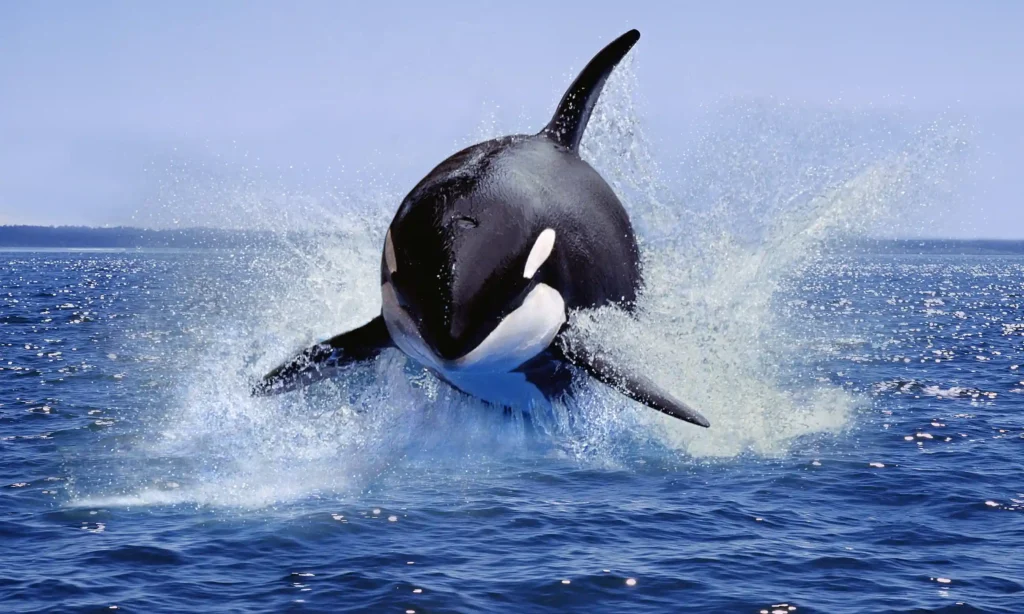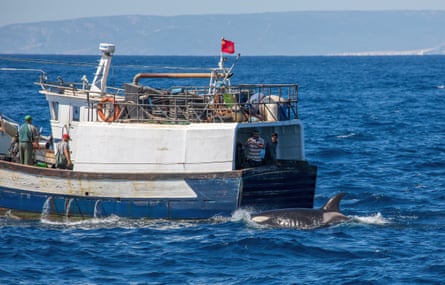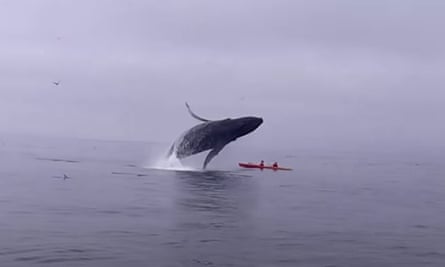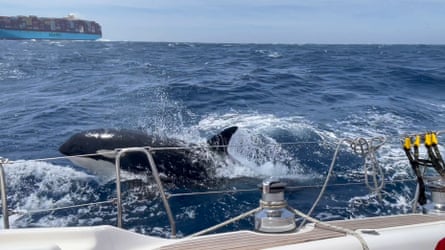The Orca Uprising: Whales Are Ramming Boats–but Are They Inspired by Revenge, Grief or Memory?
ANIMAL RIGHTS - VEGETARIANISM, 17 Jul 2023
Emma Beddington | The Guardian - TRANSCEND Media Service
A pod in the strait of Gibraltar has sunk three boats and damaged dozens of others, and their story has captivated the world. What explains this unprecedented behaviour?

Killer queen? It has been reported that the Gibraltar boat interaction was instigated by a ‘pod matriarch’.
Photograph: slowmotiongli/Getty Images/iStockphoto
11 Jul 2023 – What’s going on with the #orcauprising? You’ve probably gathered the basics: orcas are “attacking” yachts. To be strictly factual, since 2020, a small pod of orcas in the strait of Gibraltar has been interacting with sailing boats in a new way: ramming vessels, pressing their bodies and heads into the hulls and biting, even snapping off, the rudders. Over three years, more than 500 interactions have been recorded, three boats sunk and dozens of others damaged. Last month, the first instance of this behaviour was recorded in another place, when an orca rammed a boat near Shetland. “What I felt [was] most frightening was the very loud breathing of the animal,” said the Dutch yachtsman targeted, Dr Wim Rutten, who had been fishing for mackerel. “Maybe he just wanted to play. Or look me in the eyes. Or to get rid of the fishing line.”

There are two fascinating things about this. First, of course, what are the orcas doing? But the second is about another species entirely: us. Why do we like this story so much? Because we do: people – including me – love the idea of orcas attacking boats. Browsing through orca memes, there’s an orca as the sickle in the hammer and sickle, with the headline “eat the rich”, and a Soviet-style graphic of a heroic orca emerging under a superyacht. “What if we kissed while watching the orcas take back the ocean,” reads one tweet with 1m views, while a much-used image of an arm holding a microphone up to a captive orca has been repurposed endlessly to highly entertaining effect – I like one where it’s “singing” a bespoke version of the Meredith Brooks classic: “I’m a bitch / I’m an orca / Sinking yachts /Just off Majorca [sic] / I’m a sinner I’m a whale / Imma hit you with my tail.” We’re taking great pleasure in projecting extremely human narratives and motivations on orcas. But how wrong is that, and why does it appeal?
The first question is easier to answer, or rather not to answer: we don’t know what they’re doing or why. “What I think is most exciting about this is that actually, we don’t know at all,” says Tom Mustill, a biologist and film-maker, who wrote How to Speak Whale, after a humpback whale landed on his kayak (the jaw-dropping footage is on YouTube). “When we step outside our rush to project, it’s actually very reflective of where we’re at with cetacean sciences: we’re starting to understand that they’re so complicated and nuanced, and that individuals are very different from one another.” Even if we’re in the conscious incompetence phase of learning about orca behaviour, there are expert theories. “It could be a curious and playful behaviour,” suggests the 2021 report from the Grupo Trabajo Orca Atlántica (GTOA, or Atlantic Orca Working Group), a partnership of Spanish and Portuguese scientists.
That’s a popular hypothesis that Philip Hoare, the author of Leviathan and Albert and the Whale, broadly supports. Hoare experienced his own orca interaction in Sri Lanka, when a small pod head-butted and charged his boat: “I have never been so excited and so fearful in my life,” he tells me. “They’re tremendously powerful, incredibly intelligent, incredibly well organised; if that species wanted to do anything with us in the ocean, they could.” There are no reported instances of wild orcas killing people, but, says Mustill: “If killer whales wanted to start attacking people, disabling small vessels is a very strange way of going about that. They could just start eating swimmers all over the place.
Orcas nudge rudder of yacht near Gibraltar – Video:
There are alternative theories. The fibreglass hulls of sailing boats might just feel nice – and orcas enjoy the sensory feedback: some Canadian pods seem to enjoy rubbing themselves on smooth pebbles (you can watch them on a webcam); or it might just be a trend. As Mustill explains, a number of observed orca fads are not obviously examples of “adaptive” behaviour (meaning “useful”) – most famously the one for wearing salmon as hats. They’ve also mimicked sea lions, and some pods engage in “greeting ceremonies”, described as like “a killer whale mosh pit”. Social learning – from each other – is well documented in orca culture and, yes, “culture” is how behavioural science describes it. “These are cultural beings,” says Barbara J King, professor emerita of anthropology at the College of William & Mary, Virginia, and author of Animals’ Best Friends. “The networks of individuals in orca societies, which are led by females, are highly attuned to each other’s behaviour, so traditions evolve over time that become, in some cases, cross-generational.”

But how about revenge, as many of the memes suggest? The Atlantic Orca Working Group 2021 report also suggested the interactions might be responding to individual orcas’ experiences: “A behaviour induced by an aversive incident, and therefore a precautionary behaviour.” Given a single “matriarch” orca, “White Gladis”, appears to have started these interactions, it has been suggested a prior injury or entanglement could have led her to act. Does that make it revenge? King doesn’t dismiss the idea out of hand. “If we’re talking about capacity, it’s not outside the realm of reasonable expectation and it would not necessarily be anthropomorphic,” she says, though, “I’m not suggesting this in support of an ‘uprising’ at all.” King has worked extensively on animal grief: her Ted talk on one orca, Tahlequah, who in 2018 carried her dead calf for 17 days and 1,000 miles, has had 3.5m views. “I don’t believe grief is a human emotion; I feel the same way about joy and sorrow. So what about revenge?” She points to narratives around elephants perpetrating destructive acts, which has also been presented as possible retribution for poor treatment. “Both orcas and elephants have the memory capacity and the intelligence to put these things together.” Some primates, she says, also use “kin-redirected aggression: where if a monkey is attacked, that monkey within a short period of time redirects aggression to the relatives of the opponent.”
Orcas, Hoare says, will have a clear sense of what humans have done to their environment. As demonstrated by the actions of White Gladis, orca society is matriarchal, and females can live to 100: “They will have a memory, almost a generational memory, of a time when the ocean was not dominated by human beings; when there were not seismic surveys, steam engines then diesel engines, military sonar … The most important thing for them is sound: there will be individual whales that remember when the sea was not that noisy.”
So they know what we’ve done and we know what we’ve done too. I think one of the reasons the #orcauprising resonates is our sense of collective guilt or, as Mustill puts it, “We feel like there’s something deeply unfair happening in the ocean.” From films such as Free Willy to Blackfish, we have become aware of how grotesque the idea of keeping captive orcas is, and we’re ever-more conscious of the degraded state of our seas. Hoare says pictures of the Iberian whales suggest they are in poor condition, with ribs showing on one of the most widely used pictures. “They’re skinny. They are signifiers of this massively impacted environment.” As Grimes tweeted: “We deserve to have our boats rammed, frankly.”
King is frustrated that our response has been typified by the silliness of social media posts. “If people truly believe that this is about orcas responding to human harms, then why isn’t the response not just this jokey ‘orca uprising’?” she asks. “Why isn’t this the moment that people say: ‘Whatever the orcas are doing, I recognise anthropogenic harms. This is an opportunity for me: I’m going to stop eating their prey; I’m going to support ocean restoration; I’m going to support the idea of marine sanctuaries for captive orcas’?”
But fitting their behaviour to a narrative that suits us is entirely in keeping with our perennial misunderstanding of cetaceans. Hoare sees these interactions and our reaction to them as representative of how, over our shared history, “whales have had to change according to what we want them to be.” We’ve always imposed a narrative on whales, he explains, from their appearance in creation myths and religious texts, coupled with a view of whales as terrifying monsters, reinforced by Moby-Dick. The “utter and absolute depredation of whale populations” of the early 20th century was eventually countered by the early conservation movement and, crucially, bio-acoustician Roger Payne’s Songs of the Humpback Whale, shifting our perception of them from monstrous killers to mystical barnacled angels that sing. We see them, as Mustill says, as “incredible, empathic, beautiful”, which is also an oversimplification. A friend, he says, was recently rhapsodising about orcas. “I said: ‘You know they also toy with sea turtles and, like other cetaceans, they do infanticide?” Both Hoare and Mustill note that their rebranding from “killer whale” to “orca” was not particularly popular with scientists, as it was an accurate name for consummate predators. “Maybe they’d like to be thought of as killer whales?” says Mustill. “I’ve seen them hunting and they do these things which look like celebrations – they’re active, they leap out of the water and make a lot of noise splashing. It’s not necessarily a shameful thing to kill.”

One very human-coloured notion is the idea that orcas aren’t just taking back the ocean but are somehow fomenting revolution, since the yachts they are ramming are so intimately associated with the ultra-wealthy. White Gladis has been called “a communist orca”. As one post reads: “The orcas have done more for the working class than our elected officials ever have”; another captions the famous John Cusack boombox scene from Say Anything: “Me standing outside the yacht club playing orca sounds.” It’s silly, but so appealing. “I must admit it’s very attractive,” says Hoare, though he emphasises that he doesn’t want to see anyone hurt. “I love it too,” says Mustill. “We see something intrinsically fair in these giant, clever, enigmatic killers righting a wrong.” There’s also a sense of wish fulfilment. “It speaks to our feeling of powerlessness,” says Mustill. “We’ve not been going out sinking billionaires’ yachts, even though we could.”
“The killer whales are not our friends” read the headline on a much-memeified recent Atlantic article (“Jacob Stern [the author] will be the first to go in the orca revolution” as one tweeter put it). But, if they’re not friends, what are they to us? What are we to them? Could we be allies? Mustill recalls a strange and wonderful story from 19th-century New South Wales in Australia, where orcas assisted a family of whalers, who were hunting baleen whales, in return for a share of the catch (the tongue) for more than 40 years. “They’re very interested in us,” says Hoare. “Every whale I’ve met, and I’ve met thousands, they’re all interested in us. Because they know there’s nothing out there in their ocean – other than other whales – that is like us. We’re talking about all this now; there’s an equivalent conversation going on in orca society. Orca are podcasting. Literally podcasting. I’ll copyright that joke!” He sends me a 10-second recording of sound captured during his own interaction with the orca pod in Sri Lanka – a complex soundscape of clicks, rasps and squeaks that gives me goosebumps. “If you could only translate that, everything that has been written about this would be rendered defunct. We’ll all be proved wrong.”
____________________________________________
 Emma Beddington is a freelance writer.
Emma Beddington is a freelance writer.
Go to Original – theguardian.com
Tags: Animal slavery, Ecology, Environment, Humanism, Meat Industry, Oceans, Violence against Animals, Whales
DISCLAIMER: The statements, views and opinions expressed in pieces republished here are solely those of the authors and do not necessarily represent those of TMS. In accordance with title 17 U.S.C. section 107, this material is distributed without profit to those who have expressed a prior interest in receiving the included information for research and educational purposes. TMS has no affiliation whatsoever with the originator of this article nor is TMS endorsed or sponsored by the originator. “GO TO ORIGINAL” links are provided as a convenience to our readers and allow for verification of authenticity. However, as originating pages are often updated by their originating host sites, the versions posted may not match the versions our readers view when clicking the “GO TO ORIGINAL” links. This site contains copyrighted material the use of which has not always been specifically authorized by the copyright owner. We are making such material available in our efforts to advance understanding of environmental, political, human rights, economic, democracy, scientific, and social justice issues, etc. We believe this constitutes a ‘fair use’ of any such copyrighted material as provided for in section 107 of the US Copyright Law. In accordance with Title 17 U.S.C. Section 107, the material on this site is distributed without profit to those who have expressed a prior interest in receiving the included information for research and educational purposes. For more information go to: http://www.law.cornell.edu/uscode/17/107.shtml. If you wish to use copyrighted material from this site for purposes of your own that go beyond ‘fair use’, you must obtain permission from the copyright owner.
Read more
Click here to go to the current weekly digest or pick another article:
ANIMAL RIGHTS - VEGETARIANISM: